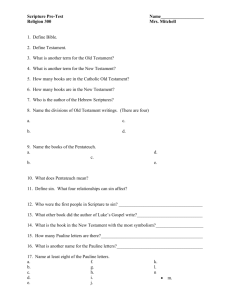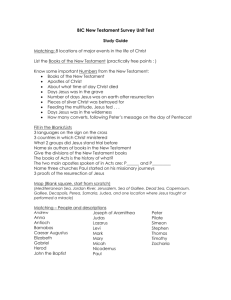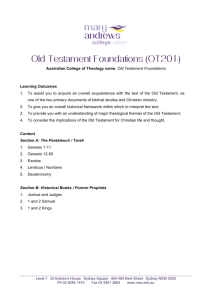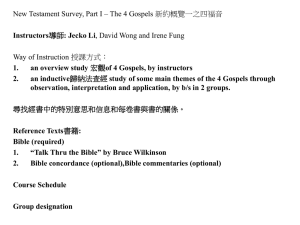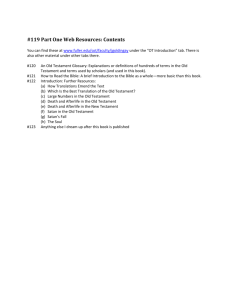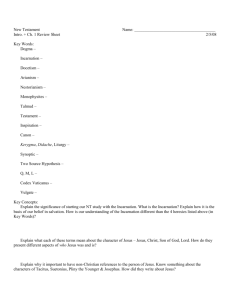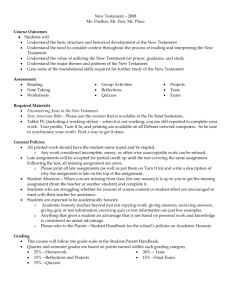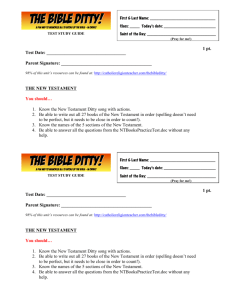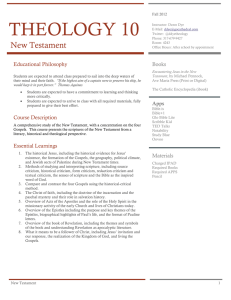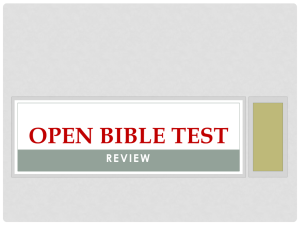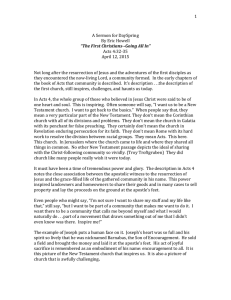TEXT - Cleveland State Community College
advertisement
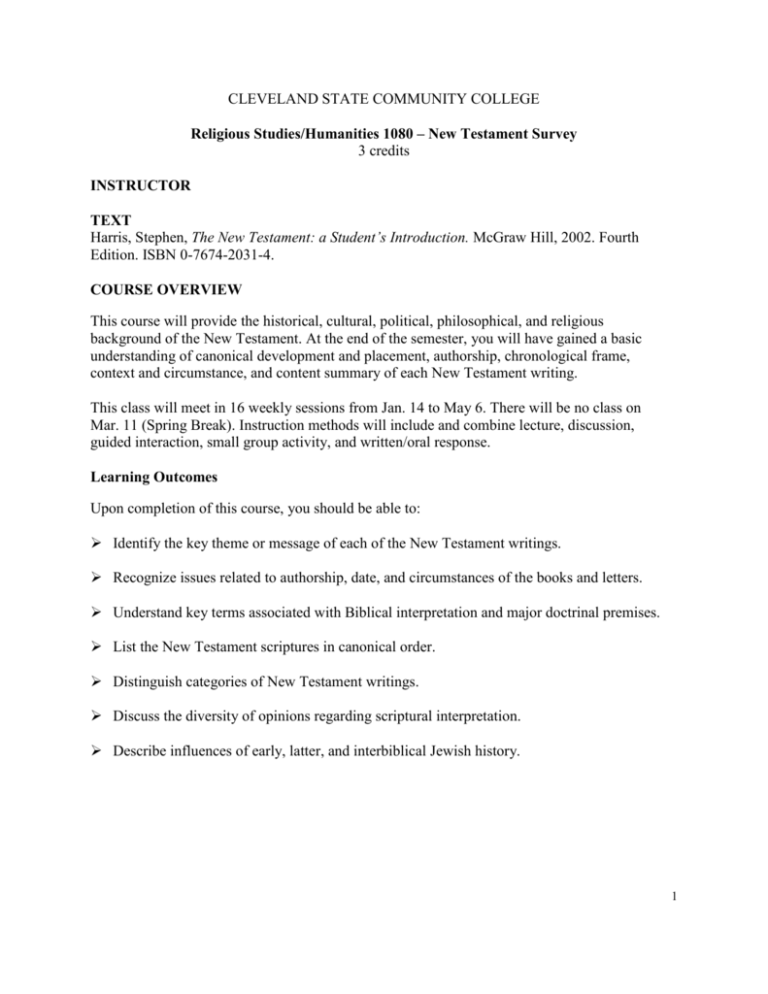
CLEVELAND STATE COMMUNITY COLLEGE Religious Studies/Humanities 1080 – New Testament Survey 3 credits INSTRUCTOR TEXT Harris, Stephen, The New Testament: a Student’s Introduction. McGraw Hill, 2002. Fourth Edition. ISBN 0-7674-2031-4. COURSE OVERVIEW This course will provide the historical, cultural, political, philosophical, and religious background of the New Testament. At the end of the semester, you will have gained a basic understanding of canonical development and placement, authorship, chronological frame, context and circumstance, and content summary of each New Testament writing. This class will meet in 16 weekly sessions from Jan. 14 to May 6. There will be no class on Mar. 11 (Spring Break). Instruction methods will include and combine lecture, discussion, guided interaction, small group activity, and written/oral response. Learning Outcomes Upon completion of this course, you should be able to: Identify the key theme or message of each of the New Testament writings. Recognize issues related to authorship, date, and circumstances of the books and letters. Understand key terms associated with Biblical interpretation and major doctrinal premises. List the New Testament scriptures in canonical order. Distinguish categories of New Testament writings. Discuss the diversity of opinions regarding scriptural interpretation. Describe influences of early, latter, and interbiblical Jewish history. 1 Course Outline Jan. Feb. Mar. Apr. May 14 Ch. 1-2: Overview of NT/Formation of Canon 21 Ch. 3-5: Historical/Cultural Environment 28 Ch. 6: Gospels – Form and Purpose Sm. Grp. Rpt. #1 Ch. 7: Mark’s Portrait of Jesus Test #1 4 11 Ch. 8: Matthew’s Portrait of Jesus 18 Ch. 9: Luke’s Portrait of Jesus 25 Ch. 10: John’s Portrait of Jesus 4 Ch. 11-12: The Other Gospels/Continuing Quest for the Historical Jesus 11 Spring Break 18 Ch. 13: Acts of Apostles 25 Ch. 14-15: Paul the Apostle/Pauline Letters 1 Ch. 16: Pauline Letters 8 Ch. 17-18: The Prison Letters and Continuing the Pauline Tradition 15 Ch. 19-21: General Letters; Apocalyptic Literature; Judeo-Christian Bible 22 Semester Summary 29 Presentations 6 Presentations Test #2 Sm. Grp. Rpt. #2 Test #3 2 ASSESSMENTS Learning outcomes will be assessed by the following methods: 3 Tests will be given as outlined above. No make-ups will be offered on tests. If a test is missed, you will receive no credit on that test. 2 Oral Small Group Reports of 10 min. each will be graded according to individual participation. Report dates are listed above. No make-up dates will be given. If a student misses a small group report date, that individual will receive no score for the report. A 5-min. final presentation will complete the course requirements. Presentation papers are expected to be typed and edited for technical errors. Topic and format for presentations will be given in class. GRADING CRITERIA AND SCALE 3 tests 20 points each 60% 2 small group oral reports 10 points each 20% participation/attendance 10 points 10% final presentation 10 points 10% 100% A B C D F 90 and above 80-89 70-79 60-69 below 60 ATTENDANCE POLICY Attendance is 10% of the course grade; it will be taken at the beginning of each class session. Absences in excess of 1 will result in a reduction of your final grade. More than 3 absences will result in a failing grade. Three tardy occurrences (arriving late or leaving early) constitute an absence. Students are entirely responsible for what takes place in class (e.g. notes, assignments, in-class work, due dates, etc.) 3 IMPORTANT DATES Classes begin Spring Break Last day to drop Good Friday Holiday Study Day – No classes Tuesday, Jan. 14 March 10-14 March 26 April 18 Thursday, May 1 DISABILITY If, because of a documented disability, you require assistance or reasonable accommodations to complete assigned course work (such as modifications in testing, readers, special equipment, etc.) you must register with Disability Support Services and notify your instructor within the first two weeks of the semester. Disability Support is located in the Office of Student Development & Testing (U118, 423-478-6217 or 423-472-7141). WITHDRAWAL DATE The last day to withdraw from this class is March 26. ACADEMIC INTEGRITY Cleveland State students are required, as a condition of good standing and continued enrollment, to conduct themselves properly in class. Such proper behavior includes academic honesty, civility, respect for others, and regard for private property. Please refer to the Student Handbook portion of the catalog for further information. 4
